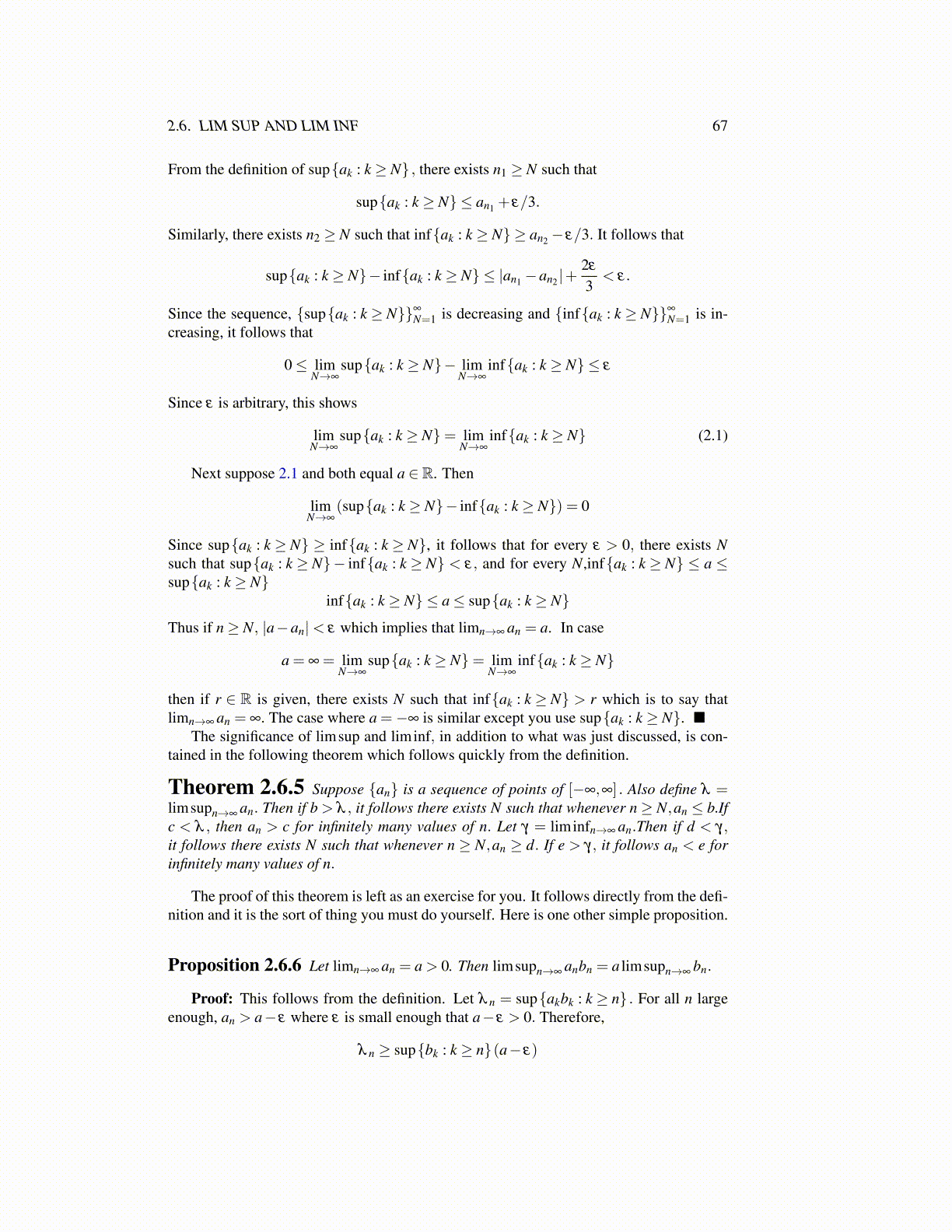
2.6. LIM SUP AND LIM INF 67
From the definition of sup{ak : k ≥ N} , there exists n1 ≥ N such that
sup{ak : k ≥ N} ≤ an1 + ε/3.
Similarly, there exists n2 ≥ N such that inf{ak : k ≥ N} ≥ an2 − ε/3. It follows that
sup{ak : k ≥ N}− inf{ak : k ≥ N} ≤ |an1 −an2 |+2ε
3< ε.
Since the sequence, {sup{ak : k ≥ N}}∞
N=1 is decreasing and {inf{ak : k ≥ N}}∞
N=1 is in-creasing, it follows that
0≤ limN→∞
sup{ak : k ≥ N}− limN→∞
inf{ak : k ≥ N} ≤ ε
Since ε is arbitrary, this shows
limN→∞
sup{ak : k ≥ N}= limN→∞
inf{ak : k ≥ N} (2.1)
Next suppose 2.1 and both equal a ∈ R. Then
limN→∞
(sup{ak : k ≥ N}− inf{ak : k ≥ N}) = 0
Since sup{ak : k ≥ N} ≥ inf{ak : k ≥ N}, it follows that for every ε > 0, there exists Nsuch that sup{ak : k ≥ N}− inf{ak : k ≥ N} < ε, and for every N,inf{ak : k ≥ N} ≤ a ≤sup{ak : k ≥ N}
inf{ak : k ≥ N} ≤ a≤ sup{ak : k ≥ N}
Thus if n≥ N, |a−an|< ε which implies that limn→∞ an = a. In case
a = ∞ = limN→∞
sup{ak : k ≥ N}= limN→∞
inf{ak : k ≥ N}
then if r ∈ R is given, there exists N such that inf{ak : k ≥ N} > r which is to say thatlimn→∞ an = ∞. The case where a =−∞ is similar except you use sup{ak : k ≥ N}. ■
The significance of limsup and liminf, in addition to what was just discussed, is con-tained in the following theorem which follows quickly from the definition.
Theorem 2.6.5 Suppose {an} is a sequence of points of [−∞,∞] . Also define λ =limsupn→∞ an. Then if b > λ , it follows there exists N such that whenever n≥ N,an ≤ b.Ifc < λ , then an > c for infinitely many values of n. Let γ = liminfn→∞ an.Then if d < γ,it follows there exists N such that whenever n ≥ N,an ≥ d. If e > γ, it follows an < e forinfinitely many values of n.
The proof of this theorem is left as an exercise for you. It follows directly from the defi-nition and it is the sort of thing you must do yourself. Here is one other simple proposition.
Proposition 2.6.6 Let limn→∞ an = a > 0. Then limsupn→∞ anbn = a limsupn→∞ bn.
Proof: This follows from the definition. Let λ n = sup{akbk : k ≥ n} . For all n largeenough, an > a− ε where ε is small enough that a− ε > 0. Therefore,
λ n ≥ sup{bk : k ≥ n}(a− ε)